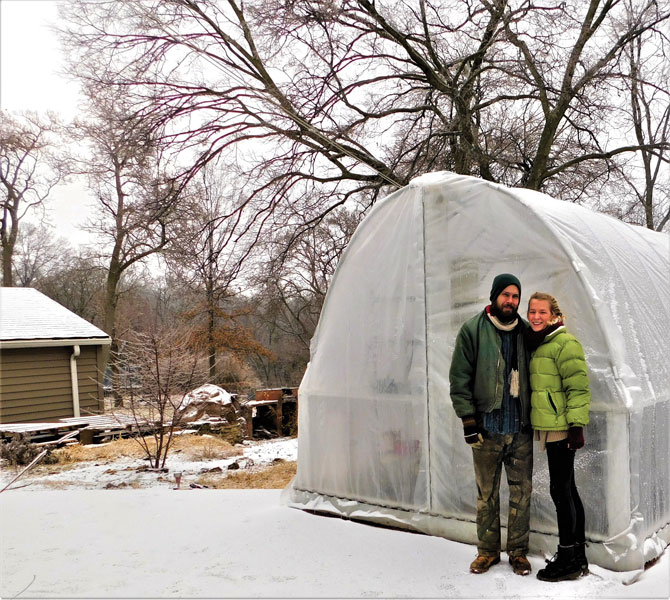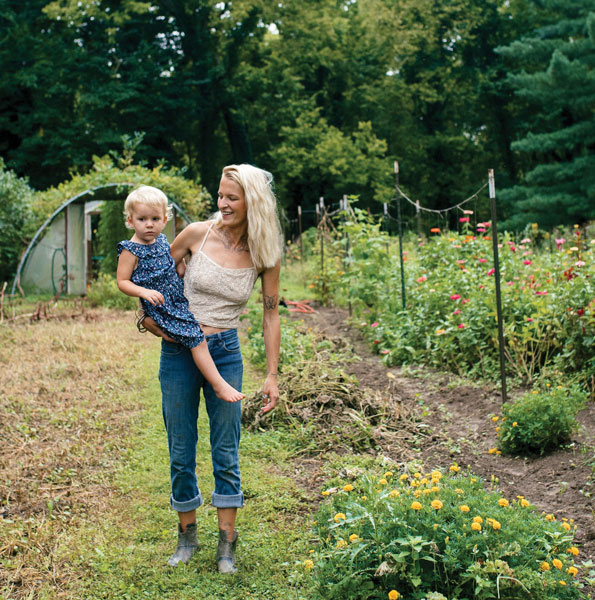6/1/2019
Embracing the Local Floral Movement
Anne-Marie Hardie

Nestled within the countryside of Cincinnati, Ohio, is the charming home of Celeste Shumarck and Nathan Reidel, owners of Village General Farms. At a glance, it appears as a typical homestead, with a few chickens, a small greenhouse and a vegetable garden. However, hidden in the backyard is a ¼-acre farm brimming with the bright blooms of local cut flowers.
When asked about her first exposure to gardening, Celeste shared that both her parents were avid gardeners. Her mother loved landscaping, while her father maintained a large vegetable garden.
“As a child, I resented my gardening chores,” she laughed. But it didn’t take long for that to change—in fact, her first summer job involved working at a greenhouse.
Pictured: Celeste Shumarck and Nathan Reidel, owners of Village General Farms outside of Cincinnati, Ohio, in front of one of their hoophouses where they start propagating their cut flowers.
But it was her position at a local florist in Arizona that confirmed that Celeste’s passion and future career was in horticulture.
“The work ethic of the women at this operation inspired me. They were able to take a bunch of random things and pull them together into something beautiful,” said Celeste.
Through this position, she developed an understanding of textures, colors and the concept of foraging to add local greenery and wild flowers into cut flower arrangements. It was also her first exposure to season extension, a technique that would become invaluable in her hometown. Although she loved her position, Celeste yearned to return home to her friends and family back in Ohio.
Discovering her path
“I felt a little bit aimless and was uncertain of what I wanted to do,” Celeste shared. “But I knew that I found my passion and wanted to continue working in the green industry.”
Celeste began working at Greenfield Plant Farms, the local greenhouse where she was exposed to annual and perennial production, bare root plants, stem cuttings, starting from seed and overall greenhouse management. The education and experience that she received at Greenfield provided a solid foundation of greenhouse and plant management. It was also where she was introduced to microgreen farmer Nathan, her future life and business partner.
It didn’t take long for the couple to discover that they shared an interest in sustainability and local produce. Not wanting to be passive observers of the movement, they decided to own and operate their own CSA vegetable farm as a side income. With three young children at home, Celeste was looking for a way to transform their side business into her full-time career.
“I was working nights and weekends at home; it was a lot,” Celeste recalled. However, the couple realized that without having a farm stand of some sort, it was challenging to attract customers and keep them engaged. It was around this time that they were introduced to a company who had tapped into the local flower movement.
“We fell in love with the entire concept and immediately saw the potential in our local market,” said Celeste. So, in January 2018, Village General Farms introduced an eight-week bouquet subscription to their offerings.
A twist in their path
Cut flowers were already a part of their homestead farm, but they were grown primarily so that they could have some nice pollinators on the property and add some fresh flowers to their kitchen table. Now, Village General Farms was looking at how they could transform these flowers into an income. Their eight-week bouquet CSA and inaugural spring floral sale in May 2018 introduced their customers to the bounty of locally grown cut flowers that were hidden in their backyard.
 Their transition to a full-service local florist was sparked when a local customer, who had fallen in love with Village General Farms’ flowers, asked if they did weddings. Excited by this possibility, Celeste immediately said yes, thrilled to be able to use the floral design skills that she’d learned in Arizona.
Their transition to a full-service local florist was sparked when a local customer, who had fallen in love with Village General Farms’ flowers, asked if they did weddings. Excited by this possibility, Celeste immediately said yes, thrilled to be able to use the floral design skills that she’d learned in Arizona.
“Our first wedding was fantastic,” she shared. “We went a bit overboard. Learning how to budget and doing things economically—it has been a learning curve for us.”
Pictured: Celeste Shumarck and her daughter Iris in one of their cut flower fields. Village General Farms is a cut flower provider for local florists, and also operates as a full-service florist for weddings and events, and offers a bouquet subscription service.
By the end of the season, Village General Farms had grown and arranged the flowers for three weddings. It didn’t take long for the couple to realize that the local floral movement was brimming with potential. At the end of 2018, the couple had mapped out goals for the upcoming year, including booking at least four weddings. As of April, they’d already surpassed these goals, with 10 weddings on their books for the upcoming season.
“Growing and supplying local flowers goes with our ethics of doing things locally,” said Celeste. “I think the ‘slow flower’ [movement] is amazing and a natural evolution from the slow food movement.”
Today, the company has fully evolved their operation into a full-service florist, including the bouquet subscription, floral designs and arrangements, and becoming a wholesale supplier to their local florists. The local cut flower movement mirrors that of the local food movement with fresher, higher-quality products and a reduced carbon footprint.
To help jumpstart the season, Celeste and Nathan plant anemones and other less-hardy florals into their own site propagation house. This year, they’re extremely excited about the addition of several varieties of cut flowers, including ranunculus, rudbeckia and 50 varieties of dahlias.
For the future, Celeste hopes to continue to expand the floral side of their operation, including adding in a large hoop house to help start and house the flowers in the cooler months. Currently, they have an unheated hoophouse in their fields, which is mainly used for their propagation house and to provide a jump start to the season.
The journey into horticulture is not without challenges—crop failures happen, Celeste said, but it’s important to be easy on yourself and keep plugging away. It’s important that farmers recognize that they don’t have to do everything on their own, said Celeste. In fact, she credits their participation with their local farmer network, which has been an incredible resource to combat the hurdles they’d confronted over the years.
“They have been such a wonderful network and support group throughout our journey,” said Celeste. GT
Anne-Marie Hardie is a freelance writer/speaker from Barrie, Ontario, and part of the third generation of the family-owned garden center/wholesale business Bradford Greenhouses in Barrie/Bradford, Ontario.